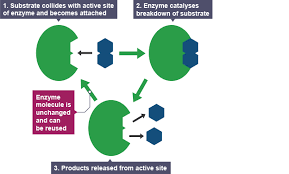Why does the small intestine require an alkaline pH?
1 Answer
Because of the enzymes that are situated there and the potential damage to intestinal lining.
Explanation:
The small intestine plays a large role in digestion. It does this through the use of enzymes which break down complex molecules into more simple ones. However, all enzymes need certain conditions to work.

Enzymes work because they have very specific shapes - active sites - which will only allow certain chemicals to bond with them (and therefore be affected). At temperatures or pH's that are above optimum, the enzyme becomes less efficient until it cannot work at all. We say that the enzyme is denatured.
In the small intestine, the enzymes that "work" there need an alkaline pH in order to have optimum working conditions.
A second reason is that strong acids (like hydrochloric) can end up damaging the lining of your intestine. The stomach is specially adapted to cope with these conditions (e.g. thick lining, regularly replaced cells) but the small intestine is not. Therefore, it needs the pH to be reduced to avoid damage.
Finally, the pH in the small intestine is changed through the use of bile - an alkaline substance produced by the liver. Bile is necessary as when food comes from the stomach, the hydrochloric acid used in the first stages of digestion make it too acidic.
Hope this helps, and let me know if I can do anything else:)
